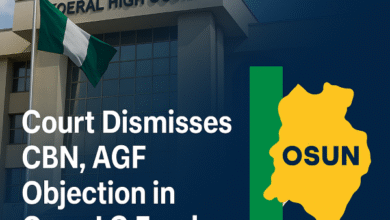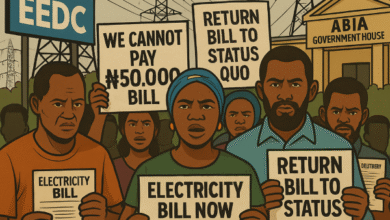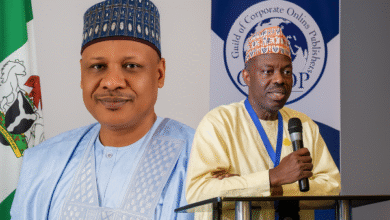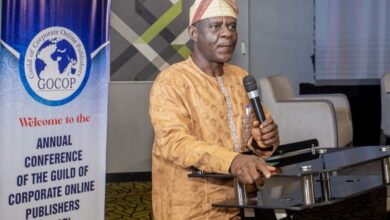BRAND PERSONALITY: You Must be Endorsed by a Professional Body before You can be Called a Professional – NIPR Registrar
 Dr. Stephen Adebayo, the registrar of the Nigerian Institute of Public Relations, NIPR, is an interesting personality. He understands the job at hand and the challenges of running the Institute day to day. Above all, he understands the limitations of both practitioners and regulators. In this engaging interview with BRANDPOWER at the Institute’s Lagos office, it is vintage Adebayo at his analytical best…
Dr. Stephen Adebayo, the registrar of the Nigerian Institute of Public Relations, NIPR, is an interesting personality. He understands the job at hand and the challenges of running the Institute day to day. Above all, he understands the limitations of both practitioners and regulators. In this engaging interview with BRANDPOWER at the Institute’s Lagos office, it is vintage Adebayo at his analytical best…
It has often been said that perhaps the NIPR is a toothless bulldog that can make noise but will not back it up with action. How do you react to this?
It is not true that the NIPR is a toothless bulldog that can bark and not bite. You have to know that we are operating in a very sensitive environment. Public relations and reputation management are very sensitive and the approach is that you must respect every individual. However, we have made frantic efforts in the past to ensure that those who practice the profession illegally are brought to book and are checked and let me say that government agencies and parastatals and corporate organisations are helping in this direction. For instance, many of them will not employ any candidate if that candidate does not have endorsement from any professional body; they will ask that you must be member of a relevant professional body. This is also an area we have exploited so that we can reduce the incidence of quackery in the business. We go after them and let me say that that we have not been making noise about it does not mean we are not at it. We are really going after them.
If someone is not registered with NIPR, does it mean he or she can not practice public relations professionally?
You cannot practise professionally because the law says that before you can practise professionally, you must be registered and just like other professional bodies, there are usually requirements and that is why the government of the day has said there must be a regulator for every particular business. The NIPR, being the certified body to regulate this practice, has been appointed by the government to regulate the practice of public relations. How will anyone now go and operate when you have not been endorsed; when the rules, the laws and the ethics of the profession have not been pronounced to you? How can you go and practise? What will be your guide when you have not been endorsed by any professional body?
You said you are putting on mechanisms to deal with those who are quacks who are operating within the industry. What of those who are registered but are involved in unwholesome practice? How do you deal with those ones?
In the act establishing the NIPR, provisions are there for strict adherence to the ethics of the profession and it is also stipulated in the law that if there is any member that does not conform to the ethics of the profession, there is a disciplinary committee set up by the Council that will deal with the member. But because of the profession we practise, we have been managing this from time to time and I must also say that we do not have many cases of unethical practices within the profession.
NIPR is a government body, how much support have you gotten from the government. You see government engage the services of public relations practitioners from time to time, does government say you are not registered with NIPR so you cannot get business from us.
Ordinarily, that is how it should be but most times, government might have its own incapacitation as to observing these rules to the core because sometimes the way the government engages some of this people may not necessarily mean to come and do the business of PR alone, it may equally involve some other things that PR may just be part of it. It’s like a medical doctor that you have hired to come and assist you to handle a particular medical case and in the cause of doing that particular job, he ventured into dentistry which is also part of general medicine. So you cannot single-handedly pick up that particular person has deviated or gone to another area that is not really his. As far as we know, government will definitely do everything possible because even before then, we usually relate with the government and government involves us by way of advice that we give to the government in certain policies and some matters that equally affects the generality of the people of the country. So if government decides to engage some people without due consultation with the NIPR they must have done it because of possibly the matter on ground or what they have on their hands.
Many have been asking questions about the relationship between the national body and the state bodies which are run by practitioners who are elected into positions. Can you throw light on this?
Usually people have a misconception as to what the chapters really are and what the national body really is. The national is the body, is the father who gave birth to all the chapters. By a single meeting we can cancel any particular chapter so they are not in rivalry with us or in competition with us. They are just there to represent us in particular states and part of why the bye laws also provide for state chapters is for the fact that those who are practicing within a particular geo-political zone can come together, rub minds and see how they can move forward in the profession itself. So that is why these chapters are being created, they are not really there as autonomous bodies. In fact, whatever assets they have they are holding those things for us in trust. So that is the kind of relationship that exists and we are always together; it is like a son and a father, how can you really differentiate the thing?
Elections into positions within the NIPR have been acrimonious in some cases. Lagos few years ago is a case in study. This does not augur well for the image of the Institute. How do you react to this?
When it comes to the election into the chapter executive council, we need to really understand exactly what the law says as regards this. Most times what many outsiders consider as being acrimonious are not really acrimonious and the reason is this. We have a laid down rule as provided for in the constitution and the chapter itself will set up an electoral committee that will provide an electoral guidelines. So those electoral guidelines will be the standard of which all contestants will have to comply with and what they normally do is that they have to reach out to the national secretariat. It is the national secretariat that will go and conduct that election and the requirement usually is that you must have paid your dues up to date; you must be relevant to the activities of the chapter and not only that, you must also be up and doing in the profession. You must be current and you must have supported the chapter and the national body and the profession itself in so many ways. So if you have done all of that, then you will be able to qualify to contest for whatever position that you want in the executive council of the state.
There are many corporate organisations employing journalists to handle their corporate communications and PR. Many of these journalists, you and I know, are not certified NIPR members. Does it mean they are practicing illegally?
It’s a game of the usual saying “garbage-in garbage-out” your output is dependent on your input, so if you decide to hire a school certificate holder to be the chief executive of your multinational company so be it. What you put in is what you get at the end of the day. What we are saying is that, for truly professional organisations that are professionally oriented, organisations that really want the best will definitely employ those who are relevant, those who are professionally qualified and who have hands-on experience. But what we see most times is just an employment or an appointment anybody comes and does whatever he or she thinks that PR is. And really, that is why we keep seeing these problems lingering because if we don’t put the right peg in the right hole, then we’ll have problems and the message we are sending to them is that let them employ the right people to man the right positions. Whether you are a journalist, you have your job, you have your field where you can perform 100% effectively and efficiently so if you are a medical doctor, you cannot go to the business of law profession and you think you can do your best there, you cannot excel. So the same way we are encouraging other professions, get people who belong to other professions that will do that work. Do not to allow interlopers to come and take over the business that is not theirs.
We have seen situations whereby people use the word PR to refer to outright bribery. Doesn’t this trend disturb the Institute?
We cannot really take that away because it is an issue of ignorance. If we are ignorant of what you are doing and you don’t care whether it is right or wrong, then you are just on your own. But what we know basically is that the word is being misused and it is just that we are exposing our ignorance, if we have to travel outside this country to such countries where PR is being used to the best of their ability and it is working for them and you get there and you are saying PR is bribery there is a way they are going to look at you. So we encourage them to use the right word for the right expression that they want to communicate because if you look at PR, it is not about bribery. It is not about inducement, is not about gratification. It is purely a relationship management thing and that is what it stands for which is based on truth and not any other thing.











